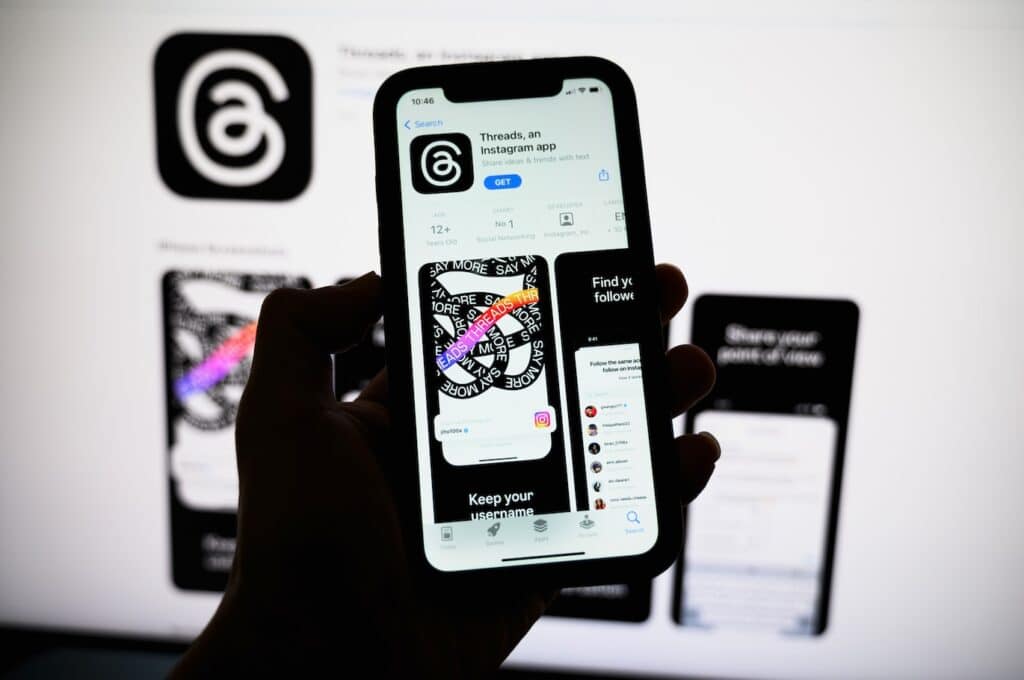Subscribe to our newsletter
Will researchers try new Threads?
Today sees the launch of Threads, the new social media platform from Facebook and Instagram parent company Meta. The news has been greeted with much anticipation – and not a little humour – from users and the latest clash between Twitter’s Elon Musk and Threads’ Mark Zuckerberg. But will the new channel pack a punch for academics who might use it in their research? Social media and research communications expert Andy Tattersall provides the tale of the tape.

How will Threads square up to Twitter in the social media arena? Do academics need another platform to disseminate their research?
When Facebook’s parent company Meta announced it was launching its own microblogging rival to Twitter, it felt inevitable but also sent a shudder down the spine of many people living in my part of the world. Whilst Threads might seem like a suitable, if not cliched name for the platform, given Twitter’s use of threaded updates, it also conjures up dystopian images. Firstly as those of a certain age will remember, Threads was a British-Australian BBC produced TV film that depicted a fictional nuclear war, at a time when this felt like a real possibility. It was set in Sheffield, near to where I grew up and currently work. Whilst the newest social media kid on the block is unlikely to result in that kind of devastation, it does appear to be spurred on by an increasingly public spat between the two tech giants Elon Musk and Mark Zuckerberg. And at first glance on launch day, Threads appears remarkably similar to its established rival in terms of functionality, although there is no Direct Message function. In addition, it does not have a desktop version, which for some might seem progressive, but for professionals it implies the whole thing has been rushed.
What lies ahead for Threads?
The latest addition to the researcher’s communications toolkit is unlikely to gain large numbers of followers from academia overnight. When Musk took over Twitter last year many from the academic community saw it as the final straw due to the platform’s increasingly toxic environment. Mastodon was one of the winners from the exodus with an estimated 200,000 new users in those first few days. The number jumped to over two million new subscribers in the following weeks. I was one of them and like many reminisced as Mastodon felt very much like Twitter a decade earlier, fresher, friendlier and more focused. Yet it did not have the critical mass due to the siloed nature of Mastodon’s servers, known as Instances. Despite the Twitter backlash it was much harder for organisations to make the switch and leave behind carefully constructed audiences. Also, Twitter was widely acknowledged as the number one communications tool for academics, largely due to its ease of use (it is easy to use, harder to use it well), but also because the institutions, media, funders and public were all on there. The initial weeks after Musk’s takeover I found myself juggling both platforms, initially using cross-posting tools until Musk intervened to turn off access to helpful independent platforms that allowed that kind of functionality. Twitter’s changes in policy and direction also led me to use LinkedIn a bit more, where I have seen increased activity across my network, whilst also endeavouring to engage in specialist groups more.
Where Threads might be different
Twitter is a tool in isolation, it has no associated social media platforms to lean on to for leverage. Threads is different, in that it will rely heavily on its social media siblings Facebook and Instagram to help with the launch. Their combined user base far outstrips that of Twitter, the question will be whether fans of those two platforms will adopt it and how well will they work as a suite of tools. For it to be a useful academic tool it needs the public, the organisations, publishers, funders and the public on board. Where it is likely to be different from Twitter is how it is openly controlled by the owners. Twitter is seen by many as Musk’s plaything which he uses to flirt with conspiracy and controversy. Whilst Facebook, also collectively guilty of various internet misdemeanours, does not have a large personality publicly shaping the platform on the fly. Having a major tech company behind you is no guarantee that your new platform will take off. One only has to look at Google’s various attempts and subsequent failures with their forays into social media. On a personal level, as someone who had given up Instagram, it was annoying that I had to revive my Instagram credentials to sign up for a Threads account. This in itself may be a major barrier to many new users, especially as you are stuck using your Instagram account name by default. This is problematic if you have a personal identity (where you use a fictitious name) and want your academic Threads profile to have your real name. As an aside, it could mean ultimately Instagram gains millions of new users as a by-product, whether they engage is another thing. Whilst its launch has been delayed in the EU, which hardly helps connecting academics together.
What does this mean for academia?
For those academics communicating their research it means another platform to consider. This in itself is problematic, as with too much choice the easiest option is to just ignore them all or stick with what you know. Communicating one’s research is not only a good thing to do, it is increasingly regarded as an important part of the research lifecycle. It can help increase citations, form collaborations, generate impact and project your work to those who may not be aware of it but find it beneficial. The demands on academics’ time and attention means there is little or no room to explore new platforms. Not only are there a plethora of general and specialist social media platforms, but there are also other mediums to consider. Blogging, podcasts, videos, animations and discussion forums provide valuable ways to reach out to different audiences. Academics do not have the time to critically appraise and learn this growing suite of technologies, which is something I try to do, which is far from easy. Hence why so many researchers and aligned professionals either pay to learn about which tools to use properly, or outsource the work altogether to external consultants.
Facebook is the number one social media platform but one that the academic community has never truly taken advantage of. To a large extent, this is a shame as it is global, has a decent demographic spread between young and middle-aged adults, and has good functionality, especially in relation to groups and pages. It is used by academics and groups, in particular for reaching groups and communities or by targeted adverts. However, on an individual level it has struggled to strike a balance between professional and personal identities. Twitter is much easier to navigate between multiple accounts and networks. So if academics can look beyond that and see Threads as a whole new platform it may be useful. No doubt whatever happens, it will highlight even more tensions between Musk and Zuckerberg, how much of it is real or for show, nobody knows. Nor can anyone predict what Musk will do as a result, some have long predicted Twitter’s demise and there is a possibility that one of the contenders could knock the other one out, in the ring or on the web.

About the Author
Andy Tattersall is an Information Specialist at The School of Health and Related Research (ScHARR) and writes, teaches and gives talks about digital academia, technology, scholarly communications, open research, web and information science, apps, altmetrics, and social media. In particular, their applications for research, teaching, learning, knowledge management and collaboration. Andy received a Senate Award from The University of Sheffield for his pioneering work on MOOCs in 2013 and is a Senior Fellow of the Higher Education Academy. He is also Chair for the Chartered Institute of Library and Information Professionals – Multi Media and Information Technology Committee. Andy was listed as one of Jisc’s Top Ten Social Media Superstars for 2017 in Higher Education. He has edited a book on altmetrics for Facet Publishing which is aimed at researchers and librarians.
